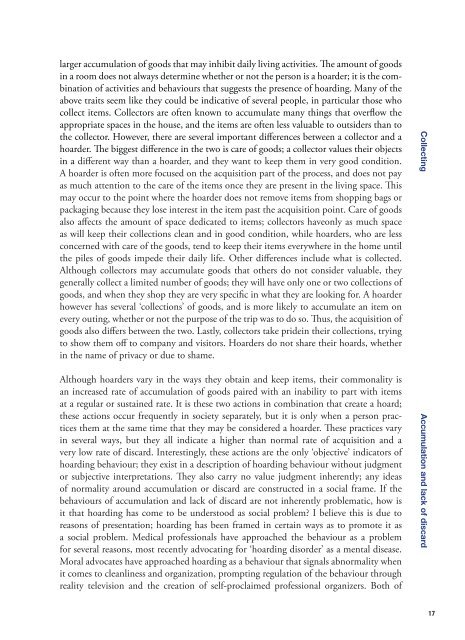Publication (142 pages).
You also want an ePaper? Increase the reach of your titles
YUMPU automatically turns print PDFs into web optimized ePapers that Google loves.
larger accumulation of goods that may inhibit daily living activities. The amount of goods<br />
in a room does not always determine whether or not the person is a hoarder; it is the combination<br />
of activities and behaviours that suggests the presence of hoarding. Many of the<br />
above traits seem like they could be indicative of several people, in particular those who<br />
collect items. Collectors are often known to accumulate many things that overflow the<br />
appropriate spaces in the house, and the items are often less valuable to outsiders than to<br />
the collector. However, there are several important differences between a collector and a<br />
hoarder. The biggest difference in the two is care of goods; a collector values their objects<br />
in a different way than a hoarder, and they want to keep them in very good condition.<br />
A hoarder is often more focused on the acquisition part of the process, and does not pay<br />
as much attention to the care of the items once they are present in the living space. This<br />
may occur to the point where the hoarder does not remove items from shopping bags or<br />
packaging because they lose interest in the item past the acquisition point. Care of goods<br />
also affects the amount of space dedicated to items; collectors haveonly as much space<br />
as will keep their collections clean and in good condition, while hoarders, who are less<br />
concerned with care of the goods, tend to keep their items everywhere in the home until<br />
the piles of goods impede their daily life. Other differences include what is collected.<br />
Although collectors may accumulate goods that others do not consider valuable, they<br />
generally collect a limited number of goods; they will have only one or two collections of<br />
goods, and when they shop they are very specific in what they are looking for. A hoarder<br />
however has several ‘collections’ of goods, and is more likely to accumulate an item on<br />
every outing, whether or not the purpose of the trip was to do so. Thus, the acquisition of<br />
goods also differs between the two. Lastly, collectors take pridein their collections, trying<br />
to show them off to company and visitors. Hoarders do not share their hoards, whether<br />
in the name of privacy or due to shame.<br />
Although hoarders vary in the ways they obtain and keep items, their commonality is<br />
an increased rate of accumulation of goods paired with an inability to part with items<br />
at a regular or sustained rate. It is these two actions in combination that create a hoard;<br />
these actions occur frequently in society separately, but it is only when a person practices<br />
them at the same time that they may be considered a hoarder. These practices vary<br />
in several ways, but they all indicate a higher than normal rate of acquisition and a<br />
very low rate of discard. Interestingly, these actions are the only ‘objective’ indicators of<br />
hoarding behaviour; they exist in a description of hoarding behaviour without judgment<br />
or subjective interpretations. They also carry no value judgment inherently; any ideas<br />
of normality around accumulation or discard are constructed in a social frame. If the<br />
behaviours of accumulation and lack of discard are not inherently problematic, how is<br />
it that hoarding has come to be understood as social problem? I believe this is due to<br />
reasons of presentation; hoarding has been framed in certain ways as to promote it as<br />
a social problem. Medical professionals have approached the behaviour as a problem<br />
for several reasons, most recently advocating for ‘hoarding disorder’ as a mental disease.<br />
Moral advocates have approached hoarding as a behaviour that signals abnormality when<br />
it comes to cleanliness and organization, prompting regulation of the behaviour through<br />
reality television and the creation of self-proclaimed professional organizers. Both of<br />
Collecting Accumulation and lack of discard<br />
17


